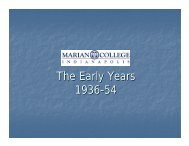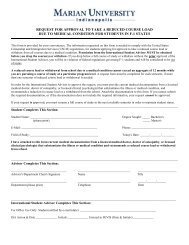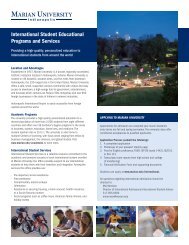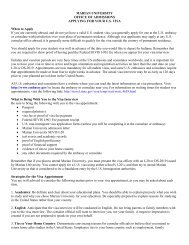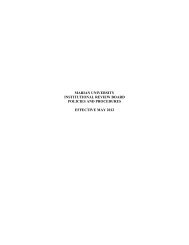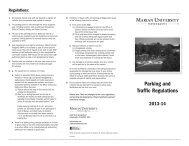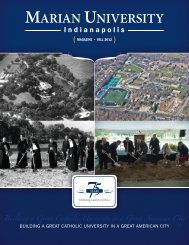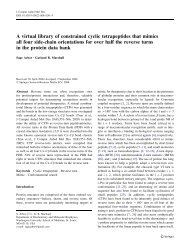2009-11 Marian University Course Catalog, fall 2010 edition
2009-11 Marian University Course Catalog, fall 2010 edition
2009-11 Marian University Course Catalog, fall 2010 edition
Create successful ePaper yourself
Turn your PDF publications into a flip-book with our unique Google optimized e-Paper software.
ART 491<br />
Portfolio Preparation 2 credits<br />
This class focuses on professional practices in the studio and<br />
graphic arts. Students are guided toward career or graduate<br />
school admittance, and receive instruction in resume writing<br />
and guidance in crafting an artist’s statement. Students<br />
receive help and encouragement in applying to juried shows,<br />
and are assisted in preparation of their senior portfolios. Two<br />
contact hours per week. (FAL)<br />
ART 499<br />
Independent Study 1-3 credits<br />
Prerequisite: permission. Advanced work in any art subject,<br />
including a planned program while engaged in foreign travel.<br />
Studio fee is assessed when department space and<br />
equipment are utilized. Student may enroll for one to three<br />
credits. (SEM)<br />
BIO 150<br />
Biology I - General Biology 4 credits<br />
Basic principles of biology from the molecular level through<br />
the cellular level of organization. Three lecture hours and<br />
three lab hours per week. This course partially satisfies the<br />
general education requirement in the scientific and<br />
quantitative understanding category. (FAL)<br />
BIO 201<br />
Academic Tools of Science 1 credit<br />
This course will prepare science students with all the essential<br />
tools required to do academic science. Students will learn<br />
how to use the library and the internet to identify high quality<br />
published research. With this as technical underpinning,<br />
students will learn how to write a primary research paper,<br />
how to write a review article, how to make and deliver an<br />
oral presentation. One semester hour, one lecture period per<br />
week, no laboratory period. (FAL) Cross listed CHE 201<br />
BIO 202<br />
Evolution and Ecology 4 credits<br />
Prerequisites: (1) one year of high school biology, (2) CHE <strong>11</strong>0<br />
or CHE 151 (or concurrent). This course examines the<br />
relationships between organisms and their environment at<br />
the organismal, population, community, and ecosystem<br />
levels. It also explores the biological underpinnings of<br />
evolutionary theory, including mechanisms of evolution,<br />
speciation, phylogeny reconstruction, and evidence. Four<br />
semester hours, three lecture periods per week, one<br />
laboratory period per week. (FAL)<br />
BIO 203<br />
Genes and Genomics 4 credits<br />
Prerequisites: (1) one year of high school biology, (2) CHE <strong>11</strong>1<br />
or CHE 152 (or concurrent). This course presents the basic<br />
principles of genetics and genomics. In this course, students<br />
will examine how DNA fulfills its essential roles and the<br />
linkage of the stored information to its protein products. This<br />
linkage will be examined from both a biological as well as a<br />
computational perspective. Four semester hours, three<br />
lecture periods per week, one laboratory period per week.<br />
(SPR)<br />
BIO 204<br />
Cell Biology 4 credits<br />
Prerequisites: (1) one year of high school biology, (2) CHE <strong>11</strong>1<br />
or CHE 152 (or concurrent). A study of molecular and cellular<br />
biology with emphasis on cellular metabolism and membrane<br />
phenomena. This course will provide biology majors with a<br />
comprehensive survey of all the essential structural and<br />
functional aspects of the biology of the cell. This information<br />
should be understood by anyone working anywhere within<br />
the biological sciences. Four semester hours, three lecture<br />
periods per week, one laboratory period per week. (SPR)<br />
BIO 214<br />
Introductory Microbiology 4 credits<br />
Prerequisite: Not open to biology or chemistry majors. A<br />
study providing the basic requirements for a working<br />
knowledge of bacteria and related microorganisms, with<br />
emphasis on structure, metabolism, role in disease, and<br />
immune responses to infection. Three lecture hours and<br />
three lab hours per week. (SEM)<br />
BIO 223<br />
Human Anatomy and Physiology I 5 credits<br />
A systemic approach to the study of the structure and<br />
function of the human body. The course begins with a<br />
biochemical approach to the structure of the cell and<br />
culminates with the study of pregnancy, development, and<br />
heredity. Emphasis is also placed on histology and the<br />
musculo-skeletal, integumentary, male reproductive, and<br />
female reproductive systems. Three lecture hours and four<br />
lab hours per week. (SEM)<br />
BIO 224<br />
Human Anatomy and Physiology II 5 credits<br />
A continuation of 223. The course consists of lecture and<br />
laboratory sections that are integrated to emphasize the<br />
anatomy and physiology of the human. The topics covered in<br />
this course expound on the relationship between structure<br />
and function in the nervous, cardiovascular, lymphatic,<br />
immune, respiratory, digestive, urinary, and endocrine<br />
systems. Three lecture hours and four lab hours per week.<br />
(SEM)<br />
BIO 225<br />
Human Anatomy 5 credits<br />
The content of this course will provide a full description of all<br />
the essential aspects of human anatomy. This course is<br />
designed to provide all the essential anatomical content<br />
required for anyone going forward into a health profession.<br />
Three lecture hours and four laboratory hours per week.<br />
(SEM)<br />
72



